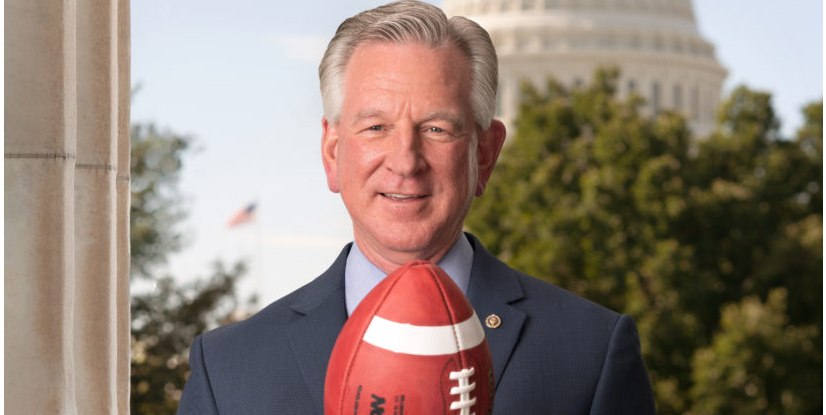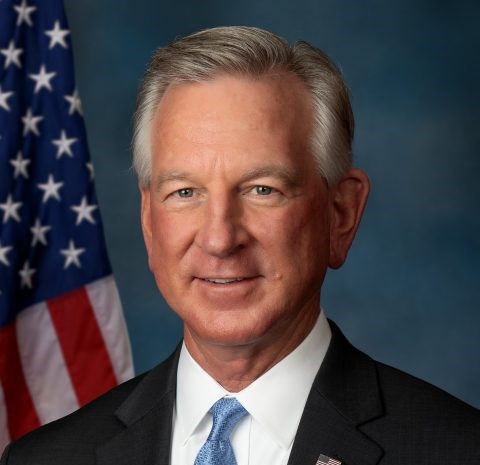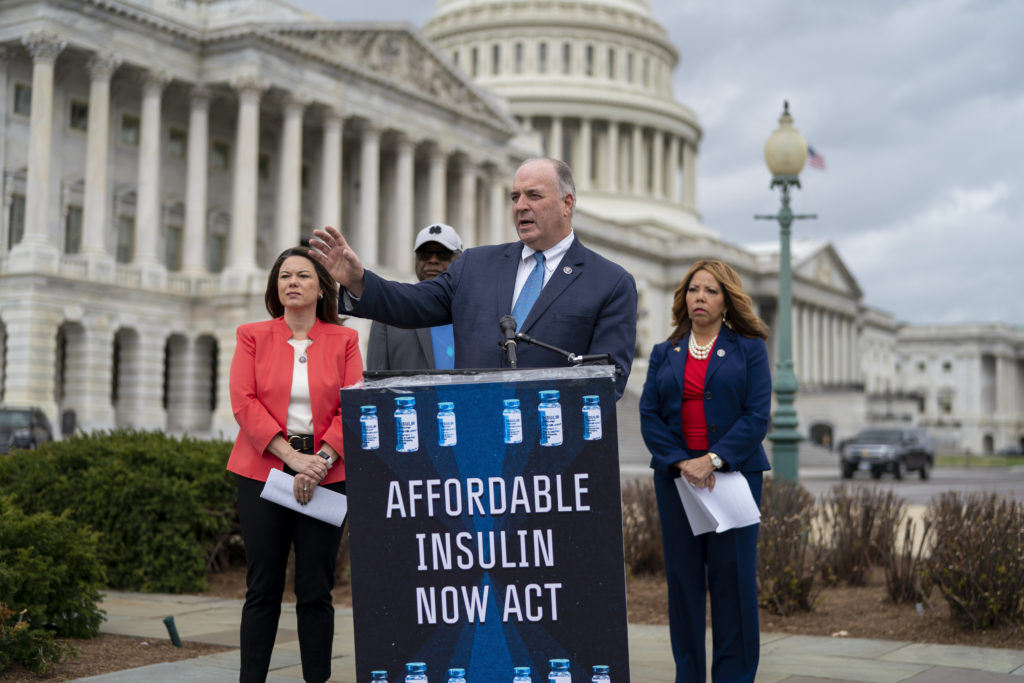Katie Britt inspects Texas border with Mexico

U.S. Senator Katie Britt participated in a press conference with national and local media outlets on Friday from the border at Anzalduas Park in Mission, Texas overlooking the Rio Grande River. Britt said that the trip aimed to learn about the border crisis in order to recommend the best possible solution. “There is an unprecedented national security and humanitarian crisis at our southern border,” said Sen. Britt. “Acknowledging there is a problem is the first step to solving it, but unfortunately, President [Joe] Biden won’t even do that. I am grateful to have this opportunity to see the problem in the Rio Grande Valley firsthand, ask tough questions, listen, and learn – so we can fight for the best possible solutions in the Senate. The number of Americans dying from fentanyl poisoning is equivalent to a commercial airplane going down in our country every single day. Just this week, CBP announced it busted a passenger vehicle that was carrying enough fentanyl to kill every single Alabamian 10 times over. It’s past time for action.” The Senate visit to the border was led by Sen. John Cornyn. “We need help from the Biden administration, but so far, we’ve gotten nothing from them other than open-border policies,” Cornyn said. Britt and the Senators talked with a group of recent border crossers who said they found a 15-year-old who drowned in the River. “The cost of this crisis is real,” Britt said. “When you look at national security, and you look at what’s happening – the hotbed of terrorism in Afghanistan. When you look at what’s going on across the globe, it was startling to hear that in this sector alone, there was an increase of Chinese nationals crossing the border year over year of 488%. Wake up. We must secure this border for the safety of our communities and the strength of them in making sure our children can thrive. As a mama, I look at the fentanyl crisis. I have a seventh-grader and an eighth-grader. This crisis knows no bounds. In the state of Alabama, we have had to use Narcan 15 times since the start of the school year. What I am telling you is that under the failed policies of Biden, every state, including my great state of Alabama, has to become a border state. How many people have to die before enough is enough?” The press conference concluded Senator Britt’s third trip to the border as a U.S. Senator. This trip to the Rio Grande Valley Sector in Texas also included Senators John Thune, Roger Wicker, Deb Fischer, and Pete Ricketts. The senators participated in both night and daytime tours of the border with law enforcement on land and water, visited the Border Patrol’s Ursula Central Processing Center, and met with local law enforcement and landowners to discuss the impact of the Biden Administration’s border policies on local communities. Additionally, the senators received briefings from the National Border Patrol Council, Customs and Border Protection, the Texas Department of Public Safety, and Texas’ new border czar to discuss federal and state efforts to secure our nation’s southern border. In her first two months in office, Senator Britt has also visited the Del Rio Sector of the border in Texas and the San Diego Sector of the border in California. Senator Britt has prioritized border security during her first eight weeks in office. Britt has introduced a robust package of four pieces of legislation and has already cosponsored an additional six bills related to the topic, including Senator Marsha Blackburn’s Stop Taxpayer Funding of Traffickers Act; Senator Chuck Grassley’s Immigration Parole Reform Act of 2023 and Accountability Through Electronic Verification Act; Senator Ted Budd’s Build the Wall Now Act; and Senator Marco Rubio’s No Coyote Cash Act and Felony Murder for Deadly Fentanyl Distribution Act. Senator Britt is the ranking member of the Homeland Security subcommittee of the Senate Committee on Appropriations. She was elected to the Senate in 2022. To connect with the author of this story or to comment, email brandonmreporter@gmail.com.
Katie Britt and Tommy Tuberville reintroduce bill to limit immigration paroles

U.S. Senator Katie Britt announced on Thursday that she joined Sens. Chuck Grassley, Tommy Tuberville, and six of their Republican colleagues in reintroducing the Immigration Parole Reform Act of 2023, limiting the executive branch’s flexibility in choosing to offer immigration parole. “There is no doubt that there is an unprecedented humanitarian and national security crisis at the border, and it’s devastating families and communities across America,” said Sen. Britt. “In addition to the Biden Administration’s weak border agenda, the President’s continued abuse of our immigration system is only compounding the problem. The chaotic combination of lawless catch-and-release and expansive parole practices must end.” Senator Britt is the Ranking member of the Homeland Security subcommittee of the Senate Committee on Appropriations, “The executive branch’s abuse of immigration parole is unacceptable and totally out of line with congressional intent,” said Sen. Grassley. “I’m proud to lead the fight to curb the abuse of immigration parole and restore order to our immigration system.” “The Biden administration is using dangerous loopholes to let more illegal immigrants into the country,” said Sen. Tuberville. “Giving parole to hundreds of thousands of illegal immigrants artificially decreases the number of apprehensions at the border and instead allows them right into the country. The American people are smarter than President [Joe] Biden thinks and can see through this abuse of power. I am proud to join this legislation that clarifies executive parole authority to ensure the Department of Homeland Security enforces our immigration laws. We shouldn’t have to pass a law requiring DHS to do its job, but I’m committed to doing what it takes to secure our southern border and hold our leaders accountable.” Immigration parole was first established in 1952. It allows the executive branch to temporarily grant individuals entry into the United States on a case-by-case basis for urgent humanitarian reasons or significant public benefit. Sen. Britt and her colleagues said that several presidential administrations have abused this authority to admit entire categories of individuals in circumvention of congressionally-established pathways to allow foreign nationals to enter the United States. Some of these parole programs were created even after Congress repeatedly rejected or failed to consider and enact legislative proposals that would have created an immigration pathway for those covered by the programs. This bill would make several reforms to ensure the executive branch complies with the original, long-standing congressional intent for the immigration parole authority. It would, among other changes, clarify that parole may not be granted according to criteria that describes entire categories of potential parolees and very clearly define what qualifies as an “urgent humanitarian reason” or “significant public benefit.” It would also provide clarity on the timing and extension of immigration parole, among other reforms. Sens. Britt, Grassley, and Tuberville were joined by Sens. Tom Cotton, Bill Cassidy, J.D. Vance, James Lankford, Mike Lee, and Joni Ernst in cosponsoring this legislation. Britt was elected to the Senate in her first run for public office. She is an attorney, former President and CEO of the Business Council of Alabama (BCA), and former Chief of Staff for former U.S. Sen. Richard Shelby. She and her husband, Wesley, live in Montgomery with their children. To connect with the author of this story or to comment, email brandonmreporter@gmail.com.
Katie Britt believes Alabama taxpayers do not want taxes paying for elective abortions

United States Senators Katie Britt and Roger Wicker joined 45 other Senators in introducing the No Taxpayer Funding for Abortion Act. This legislation would establish a single, government-wide standard to permanently prohibit the flow of federal funding for abortion. “The vast majority of Alabamians do not want their hard-earned dollars funding elective abortions in California and New York,” Britt stated. “The Hyde Amendment has saved an estimated 2.5 million lives – approximately half the population of Alabama,” said Sen. Britt. “Sadly, radicals in the Democratic Party continue to trumpet their calls for abortion at any time, for any reason. They have now targeted the long-standing, bipartisan Hyde Amendment, annually passed by Congress since 1976, which ensures federal taxpayer dollars are not used to fund abortions. It is time to make the Hyde Amendment and its lifesaving protections permanent so the far-left does not attempt to hold the nation hostage every year. The vast majority of Alabamians do not want their hard-earned dollars funding elective abortions in California or New York. I will continue to fight to defend life, support parents, grow opportunities for hardworking families, and preserve the American Dream for our children and our children’s children.” “Most Americans do not want their hard-earned tax dollars being used for abortion-on-demand, but our current patchwork of regulations has brought years of uncertainty,” stated Sen. Wicker. “The No Taxpayer Funding for Abortion Act would simplify federal rules, ensuring that American tax dollars are never used for the destruction of innocent, unborn life.” This legislation would make permanent the restrictions on funding for elective abortion and elective abortion coverage, including the Hyde Amendment, which currently relies on yearly approval. It would also eliminate Obamacare’s taxpayer subsidies for elective abortion coverage on the Affordable Care Act exchanges through refundable tax credits. U.S. Sen. Tommy Tuberville (R-Alabama) also co-sponsored the legislation. “Millions of hardworking Americans believe that life begins at conception and don’t want their taxpayer dollars inadvertently funding abortions,” said Sen. Tuberville. “As a Christian and as a conservative, I share their belief that every life is sacred and every American has a right to life. That’s why I’m proud to sign on to this legislation that will solidify abortion funding restrictions that have been in place for decades and better protect the unborn.” Britt, Tuberville, and Wicker joined Sens. Mitch McConnell (R-Kentucky) John Barrasso (R-Wyoming), Marsha Blackburn (R-Tennessee), John Boozman (R-Arkansas), Mike Braun (R-Indiana), Ted Budd (R-North Carolina), Shelley Moore Capito (R-West Virginia), Bill Cassidy (R-Louisiana), John Cornyn (R-Texas), Tom Cotton (R-Arkansas), Kevin Cramer (R-North Dakota), Mike Crapo (R-Idaho), Ted Cruz (R-Texas), Steve Daines (R-Montana), Joni Ernst (R-Iowa), Deb Fischer (R-Nebraska), Lindsey Graham (R-South Carolina), Chuck Grassley (R-Iowa), Bill Hagerty (R-Tennessee), Josh Hawley (R-Missouri), John Hoeven (R-North Dakota), Cindy Hyde-Smith (R-Mississippi), Ron Johnson (R-Wisconsin), John Kennedy (R-Louisiana), James Lankford (R-Oklahoma), Mike Lee (R-Utah), Cynthia Lummis (R-Wyoming), Roger Marshall (R-Kansas), Jerry Moran (R-Kansas), Markwayne Mullin (R-Oklahoma), Rand Paul (R-Kentucky), Pete Ricketts (R-Nebraska), Jim Risch (R-Idaho), Mitt Romney (R-Utah), Mike Rounds (R-South Dakota), Marco Rubio (R-Florida), Eric Schmitt (R-Missouri), Rick Scott (R-Florida), Tim Scott (R-South Carolina), Dan Sullivan (R-Alaska), Thom Tillis, (R-North Carolina), John Thune (R-South Dakota), J.D. Vance (R-Ohio), and Todd Young (R-Indiana). With Democrats in control of the Senate, it is unlikely that Senate Majority Leader Chuck Schumer will allow this bill to even be introduced on the Senate floor. To connect with the author of this story or to comment, email brandonmreporter@gmail.com.
Tommy Tuberville supports bill to permanently ban taxpayer funding for abortions

U.S. Senators Tommy Tuberville and Katie Britt joined 45 of their Senate colleagues in introducing the No Taxpayer Funding for Abortion Act to establish a permanent prohibition on federal funding for abortion. Tuberville said in a statement, “Every life is sacred.” “Millions of hardworking Americans believe that life begins at conception and don’t want their taxpayer dollars inadvertently funding abortions,” said Sen. Tuberville stated. “As a Christian and as a conservative, I share their belief that every life is sacred and every American has a right to life. That’s why I’m proud to sign on to this legislation that will solidify abortion funding restrictions that have been in place for decades and better protect the unborn.” “Most Americans do not want their hard-earned tax dollars being used for abortion-on-demand, but our current patchwork of regulations has brought years of uncertainty,” Sen. Roger Wicker said. “The No Taxpayer Funding for Abortion Act would simplify federal rules, ensuring that American tax dollars are never used for the destruction of innocent, unborn life.” The bill seeks to change 40 years of inconsistent policies that have regulated federal funding for abortion. It would make funding restrictions permanent for abortion and elective abortion coverage, including the Hyde Amendment, which requires annual approval. The legislation would also eliminate taxpayer-funded subsidies for elective abortion coverage currently offered on Affordable Care Act exchanges through refundable tax credits. Tuberville, Wicker, and Britt joined Sens. Mitch McConnell (R-Kentucky) John Barrasso (R-Wyoming), Marsha Blackburn (R-Tennessee), John Boozman (R-Arkansas), Mike Braun (R-Indiana), Ted Budd (R-North Carolina), Shelley Moore Capito (R-West Virginia), Bill Cassidy (R-Louisiana), John Cornyn (R-Texas), Tom Cotton (R-Arkansas), Kevin Cramer (R-North Dakota), Mike Crapo (R-Idaho), Ted Cruz (R-Texas), Steve Daines (R-Montana), Joni Ernst (R-Iowa), Deb Fischer (R-Nebraska), Lindsey Graham (R-South Carolina), Chuck Grassley (R-Iowa), Bill Hagerty (R-Tennessee), Josh Hawley (R-Missouri), John Hoeven (R-North Dakota), Cindy Hyde-Smith (R-Mississippi), Ron Johnson (R-Wisconsin), John Kennedy (R-Louisiana), James Lankford (R-Oklahoma), Mike Lee (R-Utah), Cynthia Lummis (R-Wyoming), Roger Marshall (R-Kansas), Jerry Moran (R-Kansas), Markwayne Mullin (R-Oklahoma), Rand Paul (R-Kentucky), Pete Ricketts (R-Nebraska), Jim Risch (R-Idaho), Mitt Romney (R-Utah), Mike Rounds (R-South Dakota), Marco Rubio (R-Florida), Eric Schmitt (R-Missouri), Rick Scott (R-Florida), Tim Scott (R-South Carolina), Dan Sullivan (R-Alaska), Thom Tillis, (R-North Carolina), John Thune (R-South Dakota), J.D. Vance (R-Ohio), and Todd Young (R-Indiana). Swing Republican Sens. Lisa Murkowski and Susan Collins did not sign off on the legislation, and neither did any of the 52 Senate Democrats who hold the majority in the body. U.S. Representative Christopher Smith (R-New Jersey) has introduced similar legislation in the House of Representatives. To connect with the author of this story, or to comment, email brandonmreporter@gmail.com.
Sen. Katie Britt votes against confirming Brendan Owens

On Monday, U.S. Senator Katie Britt today cast her first-ever vote in the Senate; when she voted against the confirmation of Brendan Owens to serve as Assistant Secretary for Energy, Installations, and Environment in the Department of Defense. Owens was originally nominated by President Joe Biden in March 2022 but failed to muster the support to get a floor vote during the 117th Congress. President Biden re-nominated Owens in January 2023 at the start of the 118th Congress. “The Biden Administration has consistently prioritized their reckless leftwing political agenda to the detriment of our military readiness,” said Sen. Britt. “This nominee would simply be the tip of the spear in continuing President Biden’s radical ‘Green New Deal’ priorities at the Department of Defense, which should be focused on ensuring our incredible men and women in uniform are the best equipped, resourced, and trained in the world. We achieve peace through strength, not wokeness. The last thing we need is a DOD appointee from the ESG movement.” The U.S. Senate confirmed Owens on Monday night with 60 “yea” and 35 “nay” votes. A number of Republicans voted to confirm Owens, including Sens. Shelley Moore Capito of West Virginia, Susan Collins of Maine, John Cornyn of Texas, Joni Ernst of Iowa, Lindsey Graham of South Carolina, Chuck Grassley of Iowa, Mitch McConnell of Kentucky, Jerry Moran of Kansas, Mitt Romney of Utah, Mike Rounds of South Dakota, Thom Tillis of North Carolina, Roger Wicker of Mississippi, and Todd Young of Indiana. Britt was elected in a landslide by the voters of Alabama in November after besting four rivals in the Alabama Republican Primary last spring. Senate is the first elected office she has ever held. Britt and her husband, Wesley, live in Montgomery with their two children. To connect with the author of this story, or to comment, email brandonmreporter@gmail.com.
Tommy Tuberville objects to cuts to veterans pharmacy network

U.S. Senator Tommy Tuberville and 15 of his Senate colleagues sent a letter Friday to Seileen Mullen, Acting Assistant Secretary of Defense for Health Affairs, seeking answers about TRICARE beneficiaries’ ability to maintain access to local pharmacies. On October 24, unless the VA can reach a new agreements with Express Scripts and other providers, thousands of local community pharmacies will not be able to service 9.6 million TRICARE patients and their families. Express Scripts is terminating the contract with TRICARE on October 24 instead of waiting for them to expire at the end of the year, heightening concerns that millions of veterans and their families will not be able to get their medicines at their neighborhood pharmacies. “It has been brought to our attention that Express Scripts has reduced reimbursements for prescriptions dispensed at in-network retail pharmacies for 2023,” wrote Tuberville and the other Senators. “These reductions may leave many retail pharmacies unable to participate in the TRICARE Pharmacy Program, thus significantly impacting 9.6 million TRICARE beneficiaries’ access to local pharmacies. Most recently, Express Scripts notified pharmacies and beneficiaries that current 2022 pharmacy contracts will expire October 24, 2022, rather than the end of the year. This will only further reduce the pharmacy network for TRICARE patients and their families and may force beneficiaries to change pharmacies at a time when many receive annual vaccinations.” “Pharmacists continue to be one of the most accessible health care providers in the United States,” the Senators continued. “Over 90 percent of Americans live within five miles of a community pharmacy, and 76.5 percent of pharmacies in rural areas are independent community pharmacies. As you know, in addition to dispensing medications and vaccines, community pharmacies provide services that lead to better health outcomes, lower overall administrative fees, and valuable in-person consultations with a healthcare provider.” Tuberville was joined in the letter by Sens. Tom Cotton (R-Arkansas), Roger Marshall (R-Kansas), Cindy Hyde-Smith (R-Mississippi), Chuck Grassley (R-Iowa), Steve Daines (R-Montana), John Boozman (R-Arkansas), Marsha Blackburn (R-Tennessee), Shelley Moore Capito (R-West Virginia), John Thune (R-South Dakota), Jerry Moran (R-Kansas), Mike Rounds (R-South Dakota), John Barrasso (R-Wyoming), Deb Fischer (R-Nebraska), Mike Braun (R-Indiana), and Cynthia Lummis (R-Wyoming). 15,000 pharmacies will leave the TRICARE network on October 24. To connect with the author of this story, or to comment, email brandonmreporter@gmail.com.
Tommy Tuberville praises Hoover’s National Computer Forensics Institute

U.S. Senator Tommy Tuberville praised Hoover’s National Computer Forensics Institute (NCFI) in a speech on the floor of the Senate, highlighting the importance of the NCFI and its impact on officers and public safety. Tuberville helped pass the reauthorization bill to support the NCFI, where law enforcement officers come to Alabama from across the country to receive cybercrime training. The Senate passed bipartisan legislation, the National Computer Forensics Institute Reauthorization Act, which reauthorizes the operation of the Alabama-based NCFI. The bill also approves resources for federal officers to attend the law enforcement training center, which has previously only been available for local and state officials. Sens. Tuberville and Richard Shelby (R-Alabama) cosponsored the legislation along with Sens. John Cornyn (R-Texas), Chuck Grassley (R-Iowa), Dianne Feinstein (D-California), Maggie Hassan (D-New Hampshire), Amy Klobuchar (D-Minnesota), and Sheldon Whitehouse (D-Rhode Island). “Cybercriminals can hack pipelines and other key infrastructure systems that are crucial to our daily lives and pertains to our national security,” Sen. Tuberville said. “Officials trained at NCFI are a part of our front line of defense against these attacks. That front line — our local police officers, district attorneys, and state officials — know the people they serve best. I want those protecting my home and my state trained to identify and combat the latest threats — and I’m sure you do as well.” “Earlier this year, after a madman terrorized shoppers at a grocery store in Buffalo, New York, NCFI-trained graduates were able to act quickly and support the police response,” Tuberville continued. “They used what they learned to conduct a forensic exam of a Go-Pro camera and a cell phone used by the shooter. That crucial video evidence is currently being used in the prosecution.” “Brave men and women in law enforcement across the country are willing and able to protect Americans from all crime, including cybercrime, but they need the tools and resources to continue to do so effectively,” Tuberville added. “While some in Congress and the current administration have worked to shrink the size and strength of our law enforcement, I am unapologetic with my support for the men and women in blue. We must continue to provide specialized resources that all of them need to do their jobs. That’s why I joined a group of colleagues from both sides of the aisle to introduce the National Computer Forensics Institute Reauthorization Act.” “The National Computer Forensics Institute is an example of a state’s ingenuity and foresight — a group of individuals identifying a gap that needed to be filled and providing a service with national benefits,” Tuberville explained. “The success of the Institute represents the impact state leaders, and Congress can have on the entire country when we work together to support innovative and pragmatic solutions to our biggest problems. Alabama is proud of the National Computer Forensics Institute, and we’re proud to provide cutting-edge training to many Americans and our brave law enforcement.” In 2006, the Alabama Office of Prosecution Services and the Alabama District Attorneys Association saw the need for a more coordinated effort to train law enforcement officers, prosecutors, and judges in digital evidence. Those agencies outlined a plan to bring that training to more of our law enforcement officials — and formed a unique and important partnership with the U.S. Secret Service to create a center for forensics education for state and local law enforcement officials. NCFI opened in 2008 under a roof provided by the City of Hoover. The NCFI opened with a $4 million budget and just 264 students. The 40,000 square-foot NCFI facility now taps into a $13 million annual budget to train more than 4,000 students from across the country annually. To date, more than 19,000 state and local officers, prosecutors, and judges representing all 50 states have been trained at the institute in the heart of Alabama. The NCFI focuses on teaching officials how to investigate cyber and electronic crime — always accounting for emerging tech and novel digital capabilities — to prepare graduates to combat cyber-attacks and personal data theft. The skills learned at the NCFI also prepare law enforcement officers to identify and utilize key digital data during criminal investigations. The reauthorization will allow the NCFI to keep training thousands of officers a year in Alabama to keep communities across the country safe. Graduates have reported utilizing their training in more than 578,000 digital forensics exams. The NCFI seeks to educate state, local, tribal, and territorial law enforcement officers, prosecutors, and judges in the continually evolving cyber and electronic crime-related threats, and educate, train, and equip them with the tools necessary for forensic examinations to combat those crimes. Sen. Tuberville was elected to his first term in the Senate in 2020 after a career in football coaching. To connect with the author of this story, or to comment, email brandonmreporter@gmail.com.
John Hendrickson and Pete Sepp: Make the Tax Cuts and Jobs Act permanent

No one knows the future direction of the American economy, but several danger signs are ahead. One is continued inflation at 40-year highs or worse – a cruel hidden tax that eats away wages and savings, with more suffering for families struggling to afford groceries and gasoline. Another is a recession triggered by high interest rates designed to fight inflation. This means job losses, lower incomes, smaller nest eggs as stock markets contract, and even tougher times for businesses reeling from supply-chain shortages. Yet President Joe Biden and his allies in Congress still have failed to learn the economic lesson that governments cannot tax and spend their way into prosperity. They keep believing that a brighter outcome is just one more giant deficit-financed program or tax-the-rich scheme down the road. Fortunately, policymakers have an opportunity to steer the nation in a genuinely hopeful direction by making the Tax Cuts and Jobs Act (TCJA) permanent and working to reduce government spending. States such as Iowa are already well along this proven path with policies of their own, providing better prospects for economic growth and a stable financial foundation. The Tax Cuts and Jobs Act passed during Donald Trump’s administration and, along with unshackling businesses from excessive regulation, created a strong economy. The tax relief generated by the TCJA benefited individuals as well as businesses. Employment increased, and many businesses offered bonuses to their employees. And contrary to the opposition’s fearmongering, the wealthy have paid more income taxes, and the poor have paid less. Income levels also increased as many Americans were earning higher wages. “In 2018 and 2019, real median household income in the U.S. rose by $5,000 – a bigger increase in only two years than in the entire eight years of the preceding recovery combined,” wrote economists Kevin Hassett and Tyler Goodspeed, who both served as chairs of the White House Council of Economic Advisers under Trump. The economic growth generated by the Tax Cuts and Jobs Act brought increased revenues to the federal government. This is often overlooked, and the tax cuts were blamed for causing deficits, while the real culprit was government overspending. Between 2000 and 2019, federal outlays adjusted for inflation rose 69 percent before trillions more were spent during the pandemic. The Tax Cuts and Jobs Act also showed numerous states how to lower their income and corporate tax rates. This was especially true due to capping the state and local tax deduction, or SALT, at a reasonable $10,000. In 2018, Iowa enacted a comprehensive tax reform measure, followed up this year by the largest tax cut in the state’s history. Gov. Kim Reynolds signed a tax-reform measure that creates a low individual flat income tax rate of 3.9% by 2026 and will gradually reduce the corporate income tax to a flat 5.5%. Reynolds has made prudent budgeting and tax reform a priority. “On the economy, the contrast couldn’t be more stark. While Democrats in D.C. are spending trillions, sending inflation soaring, Republican leaders around the country are balancing budgets and cutting taxes. Because we know that money spent on Main Street is better than money spent on bureaucracy,” Reynolds said in her response to Biden’s State of the Union address. Critical parts of TCJA that affect business expenses, research and development, small business relief, and low individual tax rates have expired this year or are scheduled to do so in the next Congress. Action in Washington is needed to fix these problems and address other longstanding flaws of the federal tax code. For instance, last month, Iowa’s U.S. Sen. Chuck Grassley introduced a bill called the Middle-Class Savings and Investment Act, which would allow every taxpayer in brackets of up to 22% (about $89,000 for a single filer) to invest virtually federal tax-free. The interest income deduction would increase, as well as the “Savers Credit” for low-income households. Grassley’s legislation is wisely “paid for” by extending the SALT cap. Reynolds, Grassley, and other fiscal conservatives won’t necessarily change the progressive mindset. We’re likelier to see Elvis in the grocery store. But over time, their leadership – and the data – can demonstrate that moderate taxes and spending restraints pave the way to a better future. John Hendrickson is policy director of Iowans for Tax Relief Foundation, and Pete Sepp is president of the National Taxpayers Union. Republished with the permission of The Center Square.
Tommy Tuberville, colleagues stand up for agriculture producers

On Monday, Sen. Tommy Tuberville joined 31 colleagues in sending a letter to the Securities and Exchange Commission (SEC) to push back against overreach that would place climate disclosure regulations on farmers, ranchers, and agriculture producers. The senators are concerned about the proposed rule on “Enhanced and Standardization of Climate-Related Disclosures for Investors.” The proposed rule would require publicly-traded companies to include certain climate-related disclosures in their registration statements and periodic reports. The group believes this will impose burdensome greenhouse gas reporting requirements on all entities within a company’s value chain, including farmers and ranchers who fall outside of the SEC’s congressionally-provided authority. “The SEC’s congressionally-mandated mission is to protect investors; foster fair, orderly, and efficient markets; and facilitate capital formation,” the senators wrote. “However, this proposed rule moves well beyond the SEC’s traditional regulatory authority by mandating climate change reporting requirements that will not only regulate publicly traded companies, but will impact every company in the value chain. Should the SEC move forward with this rule, it would be granted unprecedented jurisdiction over America’s farms and ranches, creating an impractical regulatory burden for thousands of businesses outside of the scope of the SEC’s purview, including our nation’s farmers and ranchers,” they continued. Other signers include U.S. Senators John Hoeven (R-ND), Tim Scott (R-SC), Cynthia Lummis (R-WY), Roger Marshall (R-KS), James Risch (R-ID), Mike Crapo (R-ID), Steve Daines (R-MT), Thom Tillis (R-NC), Richard Burr (R-NC), Ted Cruz (R-TX), John Barrasso (R-WY), Bill Hagerty (R-TN), Tom Cotton (R-AR), Rick Scott (R-FL), Chuck Grassley (R-IA), Roger Wicker (R-MS), Deb Fischer (R-NE), Kevin Cramer (R-ND), John Kennedy (R-LA), Bill Cassidy (R-LA), Mike Braun (R-IN), Mike Rounds (R-SD), Joni Ernst (R-IA), James Lankford (R-OK), John Cornyn (R-TX), Jerry Moran (R-KS), Lindsay Graham (R-SC), John Thune (R-SD), Todd Young (R-Ind.), John Boozman (R-AR) and Josh Hawley (R-MO).
Terri Sewell only Alabama lawmaker to vote yes to Democrat led $35-a-month insulin cap bill

The House on Thursday passed a bill capping the monthly cost of insulin at $35 for insured patients, part of an election-year push by Democrats for price curbs on prescription drugs at a time of rising inflation. Rep. Terri Sewell was the only yea for the bill while the rest of the Alabama legislature voted nay. Experts say the legislation, which passed 232-193, would provide significant relief for privately insured patients with skimpier plans and for Medicare enrollees facing rising out-of-pocket costs for their insulin. Some could save hundreds of dollars annually, and all insured patients would get the benefit of predictable monthly costs for insulin. The bill would not help the uninsured. But the Affordable Insulin Now Act will serve as a political vehicle to rally Democrats and force Republicans who oppose it into uncomfortable votes ahead of the midterms. For the legislation to pass Congress, 10 Republican senators would have to vote in favor. Democrats acknowledge they don’t have an answer for how that’s going to happen. “If 10 Republicans stand between the American people being able to get access to affordable insulin, that’s a good question for 10 Republicans to answer,” said Rep. Dan Kildee, D-Mich., a cosponsor of the House bill. “Republicans get diabetes, too. Republicans die from diabetes.” Public opinion polls have consistently shown support across party lines for congressional action to limit drug costs. But Rep. Cathy McMorris Rodgers, R-Wash., complained the legislation is only “a small piece of a larger package around government price controls for prescription drugs.” Critics say the bill would raise premiums and fails to target pharmaceutical middlemen seen as contributing to high list prices for insulin. Sen. Chuck Grassley, R-Iowa, said Democrats could have a deal on prescription drugs if they drop their bid to authorize Medicare to negotiate prices. “Do Democrats really want to help seniors, or would they rather have the campaign issue?” Grassley said. The insulin bill, which would take effect in 2023, represents just one provision of a much broader prescription drug package in President Joe Biden’s social and climate legislation. In addition to a similar $35 cap on insulin, the Biden bill would authorize Medicare to negotiate prices for a range of drugs, including insulin. It would penalize drugmakers who raise prices faster than inflation and overhaul the Medicare prescription drug benefit to limit out-of-pocket costs for enrollees. Biden’s agenda passed the House only to stall in the Senate because Democrats could not reach consensus. Party leaders haven’t abandoned hope of getting the legislation moving again and preserving its drug pricing curbs largely intact. The idea of a $35 monthly cost cap for insulin actually has a bipartisan pedigree. The Trump administration had created a voluntary option for Medicare enrollees to get insulin for $35, and the Biden administration continued it. In the Senate, Republican Susan Collins of Maine and Democrat Jeanne Shaheen of New Hampshire are working on a bipartisan insulin bill. Georgia Democratic Sen. Raphael Warnock has introduced legislation similar to the House bill, with the support of Sen. Majority Leader Chuck Schumer of New York. Stung by criticism that Biden’s economic policies spur inflation, Democrats are redoubling efforts to show how they’d help people cope with costs. On Thursday, the Commerce Department reported a key inflation gauge jumped 6.4% in February compared with a year ago, the largest year-over-year rise since January 1982. But experts say the House bill would not help uninsured people, who face the highest out-of-pocket costs for insulin. Also, people with diabetes often take other medications as well as insulin. That’s done to treat the diabetes itself, along with other serious health conditions often associated with the disease. The House legislation would not help with those costs, either. Collins says she’s looking for a way to help uninsured people through her bill. About 37 million Americans have diabetes, and an estimated 6 million to 7 million use insulin to keep their blood sugars under control. It’s an old drug, refined and improved over the years, that has seen relentless price increases. Steep list prices don’t reflect the rates insurance plans negotiate with manufacturers. But those list prices are used to calculate cost-sharing amounts that patients owe. Patients who can’t afford their insulin reduce or skip doses, a strategy born of desperation, which can lead to serious complications and even death. Economist Sherry Glied of New York University said the market for insulin is a “total disaster” for many patients, particularly those with skimpy insurance plans or no insurance. “This will make private insurance for people with diabetes a much more attractive proposition,” said Glied. Republished with the permission of the Associated Press.
Ketanji Brown Jackson pledges to decide cases ‘without fear or favor’

Supreme Court nominee Ketanji Brown Jackson pledged Monday to decide cases “without fear or favor” if the Senate confirms her historic nomination as the first Black woman on the high court. Jackson, 51, thanked God and professed love for “our country and the Constitution” in a 12-minute statement to the Senate Judiciary Committee at the end of her first day of confirmation hearings, nearly four hours almost entirely consumed by remarks from the panel’s 22 members. Republicans promised pointed questions over the coming two days, with a special focus on her record on criminal matters. Democrats were full of praise for President Joe Biden’s Supreme Court nominee. With her family sitting behind her, her husband in socks bearing George Washington’s likeness, Jackson stressed that she has been independent, deciding cases “from a neutral posture” in her nine years as a judge, and that she is ever mindful of the importance of that role. “I have dedicated my career to ensuring that the words engraved on the front of the Supreme Court building — equal justice under law — are a reality and not just an ideal,” she declared. Barring a significant misstep, Democrats who control the Senate by the slimmest of margins intend to wrap up her confirmation before Easter. She would be the third Black justice, after Thurgood Marshall and Clarence Thomas, as well as the first Black woman on the high court. Jackson’s sternest Republican critics, as well as her Democratic defenders, all acknowledged the historic, barrier-breaking nature of her presence. There were frequent reminders that no Black woman had been nominated to the high court before her and repeated references to another unique aspect of her nomination: Jackson is the first former public defender nominated to be a justice. “It’s not easy being the first. Often, you have to be the best, in some ways the bravest,” Democratic Sen. Dick Durbin of Illinois, the committee chairman, said in support. Sen. Cory Booker, D-N.J., spoke of the “joy” in the room and acknowledged her family’s pride as Jackson’s parents beamed behind her. Booker repeated a story Jackson has frequently told about a letter her youngest daughter wrote to President Barack Obama several years ago touting her mother’s experience. “We are going to see a new generation of children talking about their mamas and daring to write the president of the United States that my mom should be on the Supreme Court,” Booker said. “I want to tell your daughter right now, that dream of hers is so close to being a reality.” In their opening statements, Democrats sought to preemptively rebut Republican criticism of her record on criminal matters as a judge and before that as a federal public defender and a member of the U.S. Sentencing Commission. Jackson “is not anti-law enforcement” and is not “soft on crime,” Sen. Patrick Leahy, D-Vt., said, noting that members of Jackson’s family have worked in law enforcement and that she has support from some national law enforcement organizations. ”Judge Jackson is no judicial activist.” The committee’s senior Republican, Sen. Chuck Grassley of Iowa, promised Republicans would “ask tough questions about Jackson’s judicial philosophy” without turning the hearings into a ”spectacle.” Sen. Lindsey Graham, R-S.C., noted that Democrats had opposed some past Republican judicial nominees who were Black or Hispanic, and he said that he and his GOP colleagues wouldn’t be deterred by Jackson’s race from asking probing questions. He said of some criticism from the left: “It’s about, ‘We’re all racist if we ask hard questions.’ That’s not going to fly with us.” Graham was one of three Republicans to support Jackson’s confirmation, 53-44, as an appellate judge last year. But he has indicated over the past several weeks that he is unlikely to vote for her again. While few Republicans are likely to vote for her, most GOP senators did not aggressively criticize Jackson, whose confirmation would not change the court’s 6-3 conservative majority. Several Republicans used their time to denounce Senate Democrats instead of Jackson’s record. The Republicans are trying to use her nomination to brand Democrats as soft on crime, an emerging theme in GOP midterm election campaigns. Biden has chosen several former public defenders for life-tenured judicial posts. In addition, Jackson served on the U.S. Sentencing Commission, an independent agency created by Congress to reduce disparity in federal prison sentences. With Jackson silently taking notes, Sen. Josh Hawley, R-Mo., said in his opening statement that his research showed that she had a pattern of issuing lower sentences in child pornography cases, repeating comments he wrote in a Twitter thread last week. The Republican National Committee echoed his claims, which Hawley did not raise when he questioned Jackson last year before voting against her appeals court confirmation. The White House, along with several Democrats at the hearing, has rejected Hawley’s criticism as “toxic and weakly presented misinformation.” Former Alabama Sen. Doug Jones, who is guiding Jackson as she navigates the Senate process, told reporters afterward that “she will be the one to counter many of those questions” from Hawley and others on Tuesday and Wednesday. Hawley is one of several committee Republicans, along with Ted Cruz of Texas and Tom Cotton of Arkansas, who are potential 2024 presidential candidates, and their aspirations may collide with other Republicans who would prefer not to pursue a scorched-earth approach to Jackson’s nomination. Her testimony will give most Americans, as well as the Senate, their most extensive look yet at the Harvard-trained lawyer with a broader resume than many nominees. She would be the first justice with significant criminal defense experience since Marshall. Jackson appeared before the same committee last year, after Biden chose her to fill an opening on the federal appeals court in Washington, just down the hill from the Supreme Court. The American Bar Association, which evaluates judicial nominees, has given her its highest rating, “well qualified.” Biden chose Jackson in February, fulfilling a campaign pledge to nominate a Black woman to the Supreme Court for the first time in American history. She would take the seat of Justice
Tommy Tuberville introduces legislation to fix vulnerabilities in visa programs

U.S. Senator Tommy Tuberville joined Senators Chuck Grassley and Dick Durbin to introduce the H-1B and L-1 Visa Reform Act, which aims to reduce fraud and abuse, provide protections for American workers and visa holders, and require more transparency in the recruitment of foreign workers. According to Tuberville’s press release, the overhaul of the H-1B and L-1 visa programs will protect American workers and crack down on foreign outsourcing companies, which exploit these visa programs to deprive qualified Americans of high-skilled jobs. “For too long, loopholes in our immigration system have been exploited to find cheap labor at the expense of the American worker. That must change. This legislation will crack down on the manipulation of existing vulnerabilities to ensure employers prioritize the American worker before considering any high-skilled foreign applicants. If we are going to get our economy back up and running, we need to do it correctly and that begins with utilizing the talent we have here at home first and foremost,” stated Tuberville. First introduced in 2007, the H-1B and L-1 Visa Reform Act will require U.S. Citizenship and Immigration Services to prioritize for the first time the annual allocation of H-1B visas. The new system would ensure that the best and brightest STEM advanced degree students educated in the United States receive preference for an H-1B visa, and also prioritize other U.S. advanced degree holders, those being paid a high wage, and those with valuable skills. The legislation will prohibit the replacement of American workers by H-1B or L-1 visa holders and clarifies that the working conditions of similarly employed American workers may not be adversely affected by the hiring of an H-1B worker, including H-1B workers who have been placed by another employer at the American worker’s worksite. The legislation will crack down on outsourcing companies that import large numbers of H-1B and L-1 workers for temporary training purposes only to send the workers back to their home countries to do the same job. Specifically, the bill would prohibit companies with more than 50 employees, of which at least half are H-1B or L-1 holders, from hiring additional H-1B employees. The bill gives the U.S. Department of Labor enhanced authority to review, investigate, and audit employer compliance with program requirements, as well as to penalize fraudulent or abusive conduct. It requires the production of extensive statistical data about the H-1B and L-1 programs, including wage data, worker education levels, place of employment, and gender. “Congress created the H-1B and L-1 visa programs to complement America’s high-skilled workforce, not replace it. Unfortunately, some companies are trying to exploit the programs by cutting American workers for cheaper labor. We need programs dedicated to putting American workers first. When skilled foreign workers are needed to meet the demands of our labor market, we must also ensure that visa applicants who honed their skills at American colleges and universities are a priority over the importation of more foreign workers. Our bill takes steps to ensure that the programs work for Americans and skilled foreign workers alike,” Grassley stated.


